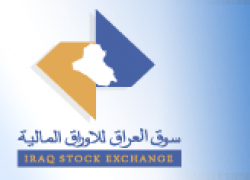
An Iraqi telecom company raised nearly $1.3 billion Sunday on Baghdad’s small stock exchange in one of the region’s biggest share offers in years — a sign of investor confidence in the fledgling private sector despite violence that still plagues the country.
In a reminder of Iraq’s volatility, several suicide attackers on foot and in two explosives-laden cars assaulted a provincial police headquarters in northern Iraq, killing at least 15 people and wounding 90. Rescue workers led away dazed survivors, including veiled women climbing over debris, and pulled several mangled and scorched bodies from the rubble.
The level of violence has dropped sharply since the worst sectarian fighting in 2006-2007, yet bombings and shootings still kill dozens of people every month. Investors say the continued security risks, along with concerns about official red tape and corruption, have restricted the growth of Iraq’s private sector.
Iraq sits on vast oil reserves, and foreign investment has focused heavily on the government-controlled energy sector.
So it was good news for the Iraq economy when nearly two-thirds of the money raised by the telecom company came from foreign buyers.
“Iraq is a very difficult place to do business in,” said Shwan Taha, head of Rabee Securities, the brokerage firm that organized Sunday’s share float of Asiacell, one of Iraq’s three main mobile phone service providers. “Iraq came out of a long dictatorship. We had 30 years of war and sanctions. We missed a lot of trains, not only one.”
Iraq is now catching up, he said. “No foreign investors come to Iraq thinking they are investing in Switzerland, and for Iraqis themselves, these bombings are becoming daily occurrences.”
Sunday’s share sale by Asiacell more than doubled the market capitalization of the low-volume Iraq Stock Exchange in a single day, from $4.7 billion to $9.65 billion, said Rabee Securities.
Asiacell had offered a quarter of its shares, or 67.5 billion. The initial share price was set at 22 Iraqi dinars, or just under 2 cents. Foreigners bought about 70 percent of the float and Iraqis bought 30 percent, for a total of $1.24 billion, the brokerage firm said.
Regular trading of the shares is to begin Monday.
It was the first stock float on the ISX, which was set up in 2004, a year after the U.S.-led invasion that toppled Iraqi dictator Saddam Hussein. Taha al-Rubaye, the head of the exchange, said he believes it’s also the largest initial public offering, or IPO, of shares in the Middle East in nearly five years.
Al-Rubaye said he hoped the Asiacell deal will send a signal to the government that investor interest is high and that it must do more, such as carrying out regulatory reforms, to encourage private business — in not just energy.
Iraq has a Gross Domestic Product of some $130 billion, largely due to its oil wealth, and 95 percent of the state budget comes from the proceeds of oil exports.
“It’s not easy to change … the mentality,” al-Rubaye said of Iraq’s decision-makers. “There are delays. They are not in a hurry. But I believe it’s also time because the relationship between Iraqis and the world is growing up.”
Padraig O’Hannelly, editor of Iraq Business News, an online newsletter, said Iraq offers significant opportunities outside the oil sector.
“Concerns about security, bureaucracy and corruption have clearly deterred many potential foreign investors, while others with a long-term view have chosen to engage with Iraq and work through the difficulties,” he said.
During Sunday’s trading session in Baghdad, several dozen Iraqis, many of retirement age, followed developments on large screens in the stock market.
First-time investor Adnan Jassim, 63, a retired government employee, said he bought 10,000 shares of Asiacell and would have bought even more if he could have afforded them. “It’s a well-known company,” he said, explaining his decision to enter the stock market.
Asiacell, which has nearly 10 million subscribers, competes against Zain Iraq, part of Kuwait’s Zain, andKorek, an affiliate of France Telecom. The Gulf state of Qatar’s government-backed Qatar Telecom had a majority stake in Asiacell before Sunday’s sale.
All three Iraqi mobile phone companies had been required to list shares on the stock exchange as a condition of their 15-year operating licenses. All three missed a deadline in August 2011 to offer shares to the public.





